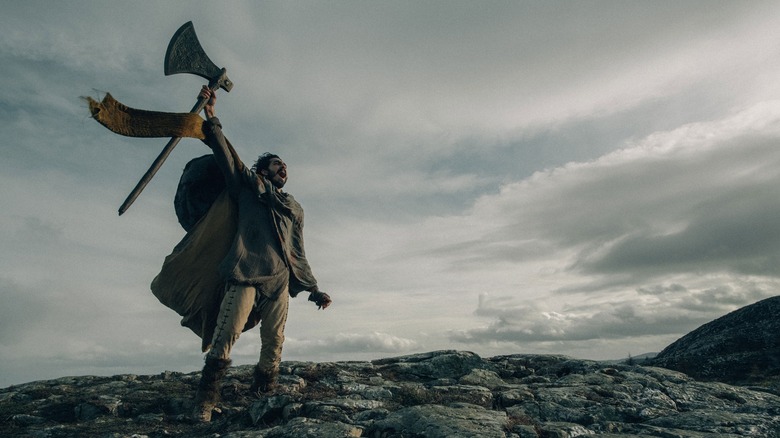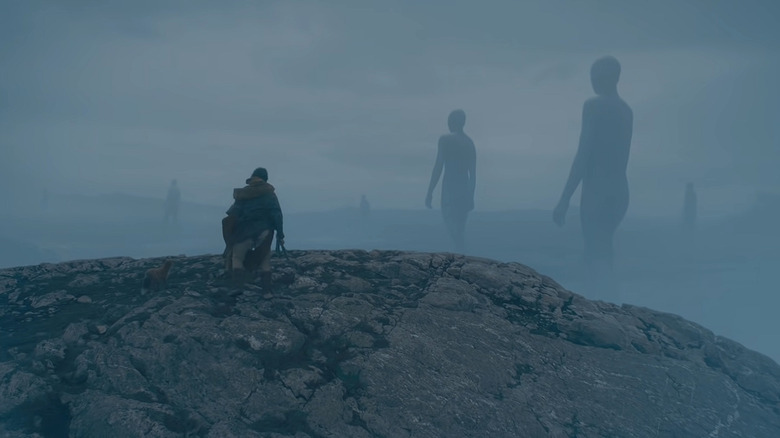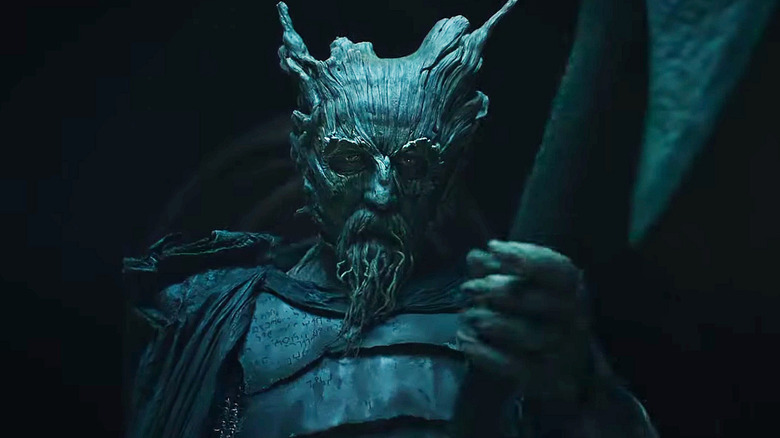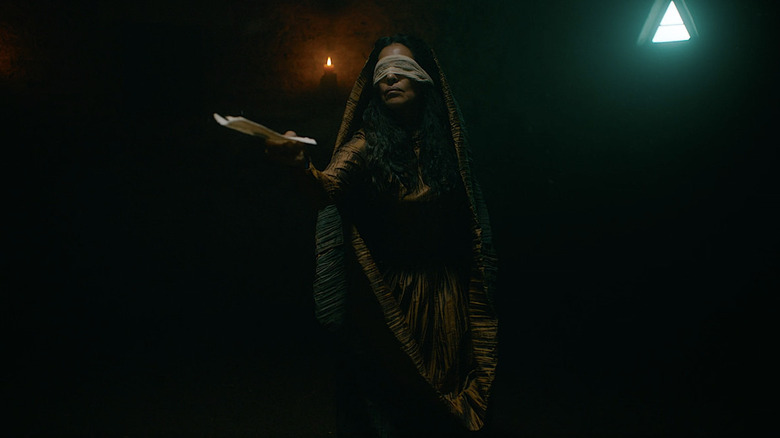The Green Knight Composer Daniel Hart On Creating 'The Giant's Call' And 'Now I'm Ready, I'm Ready Now' [Interview]
David Lowery and Daniel Hart are a match made in heaven. The introspective filmmaker and the classically trained composer have collaborated on several films now, including "The Old Man and the Gun," "A Ghost Story," and most recently, "The Green Knight," in which inevitability and time consume the protagonists. Like Lowery, Hart's music makes audiences lean in and listen instead of spoon-feeding the emotions and themes on display.
In "The Green Knight," the duo deliver their most ambitious work. Hart's score strikes the balance between reality and fantasy, both familiar and otherworldly. The score has been shortlisted for the Academy Awards and it nominated for SCL Awards for Outstanding Original Score for Independent Film. Recently, Hart spoke with /Film about his work on "The Green Knight," as well as his touring days.
"They should sound like whales."
Hearing "The Giant's Call" in the theater was quite a feeling. How'd you approach that scene?
It would've been early on in the process when I knew there were going to be giants in the film and that David wanted them to be like singing giants, because I remember thinking about it a lot from the beginning of the process. I thought about what that would sound like. The best thing that I could come up with is that they should sound like whales, like a pack of whales. I tried to make something that would feel like whales, but a little more human. I recorded myself singing in falsetto, and then I pitched it down and slowed it down. Because I thought since they're so big, their voices would be deeper, slower. It seemed to work.
The first piece of music that I wrote for it didn't work, or David didn't like it, but I did it again. I think the first thing I wrote was much more like a song, much more melodic. But then he asked me to do something a little less formed, a little more like they're bellowing into the air around them. I made that, and it was approved. We basically just recreated what I had done at home with a choir of seven women. We had these seven women singing these parts, these different giants parts. Then we put them through Varispeed [a program feature which manipulates audio], and got the sound.
Like you said, the first version didn't work for David, who wasn't happy with the movie in the beginning. How did him finding the movie, and the changes he made, impact your work?
He was not happy with it for a long time. And consequently, the music didn't feel right to him, and sometimes not to me either, just because the scenes weren't the right scenes. They weren't cut right or edited right or he hadn't gotten the take that he wanted when they were filming. There was a while when they were filming where he was really under the weather. And so, he felt like he hadn't been as 100% present as he wanted to be during filming.
It took a lot of rethinking and moving things around and editing and then reshooting some stuff to get the film into a shape that he wanted, and that happened a couple different times. And each time that happened, it required some new music. In some places, we could move around stuff that we already had recorded. But in a lot of those places, it just felt different. The scenes were cut differently. They had a different pace to them. And so, I had to make new music for those scenes. I feel like I wrote a score and a half, or a score and three-quarters.
What did you think of the early versions you saw?
I thought they were great. I thought it was an incredible film even before he changed things. It was a different film. It was a bit slower. I mean, no one's going to accuse "The Green Knight" of being too fast, but if you can imagine, it was even slower paced than the version that came out in theaters. There was less stuff explained. Like in the version that came out in theaters, I think it's fairly clear, hopefully, to the audience, that Gawain's mother is responsible for creating the Green Knight and for putting him through this test. But in the original, like in the poem and in the original version of the film, it's not so clear. It's a bit more of mystery where the Green Knight came from and why he's there.
Sarita Choudhury, who played Gawain's mother, what did her performance give you as a composer to respond to?
There was a line of hers. I think it's in the first scene with her where Gawain comes home and he's drunk, and she's like, "Where have you been?" and he says, "At mass," and she says, "All night?" and he says, "Yes, Mother," and then he kisses her and she's like, "Oh, you do smell like you've been at mass all night. What, have you been drinking the sacrament?" And she gave this performance, the original performance, it was so good. It just perfectly told you as the audience who she was and what her relationship to Gawain was. But there was noise that happened in that performance. So they had to re-record her voice, and it's like 90% the same as the original delivery. But sometimes I miss that a couple of the inflections of her voice in that original delivery because I heard it and loved it so much. I also just love that actor, Sarita Choudhury. She's...
Amazing.
Amazing in everything that she's ever done. So delightful. A delight to work with everybody, really. Sean Harris as the king, I'd only ever seen him in the "Mission: Impossible" movies as a villain. To see him as the king, what a performance.
How did you want to help set the tone and pace for the movie at the beginning?
Not with this film. When they finished filming and they started sending me the edit, the first section of the film that David was happy enough with to work on was the section with Saint Winifred in the middle of the film. So I started working from the middle. There wasn't much of a chance to ask how to set the tone from the beginning. And that stuff that I worked on in the middle did inform the beginning of the film. Like, there's this sort of jittery, stuttered recorder cluster. That is the first score that happens in the film, and that came from that middle section. I wrote it for that middle section, and we borrowed it, lifted it, and put it at the beginning because it worked so well.
But the first piece of music after that intro called "Christ Is Born Indeed," as Gawain drunkenly wanders through this brothel where he spent the night, that was one of the first pieces of music that I wrote for the film. It was a demo, like a recorder quartet and percussion demo that I had sent to David early on, before I had footage to work from, just an idea based on the script and based on visiting the set when they were filming. And he took that piece that I had written and laid it on top of that footage and felt like it worked really well. It was essentially unchanged from the first thing that I wrote. So I guess in that sense, the tone was set without even knowing what it would be. It surprisingly worked really well. It doesn't usually happen [like] that.
Now I'm Ready, I'm Ready Now
"Now I'm Ready, I'm Ready Now" is a beautiful track. How did that evolve?
"Now I'm Ready, I'm Ready Now," there was another version before that that was fairly different from what ended up in film. And it took a long time to make, because it's a longer, bigger piece of score. It needs to be really big since it's the climax of the film. There was something in round two of working on the score after a lot of stuff in round one wasn't working because David wasn't happy with the film. In round two, I wrote this piece, "I Promise You'll Not Come to Harm," which is a montage as Gawain is getting ready to leave Camelot and go and search the Green Knight. I'm a violinist by training, and I tried out this technique called arpeggiando, which I've used in other scores before as well because I like that technique on violin. I like what it accomplishes and how it sounds. It seems to work really well for many films. I tried out that technique in that montage, and it worked really well. David liked it.
So then I thought that shouldn't be the only place it happens in the film, because that will feel less cohesive. It will make it stick out more. And also, that gives me like a clue as to what I can work on, how I can approach other sections of the score. So that's where I started with "Now I'm Ready, I'm Ready Now," with the idea of it being a piece of music centered by this violin arpeggiando technique and everything else builds around it. That technique had already happened quite a lot in the film before then. There was a desire on my part, and I think from David as well, for it to be different in some way. So I spent some time with a synthesizer getting another arpeggio going that felt like it complemented the violin arpeggio technique. So it starts with a violin doing it and then a synthesizer, sort of takes over halfway through the piece and becomes the center of it.
The ending that I wrote on that round to the ending that I wrote of the piece, once it hits its big climax and then it sort of comes down and becomes quieter, was very different from what ended up in the film. I had a string-centric thing with the Nyckelharpa, which is a medieval Swedish string instrument as the centerpiece of the denouement. We swapped that out for some choir, so the score ends with this choral reprise of a piece from earlier in the film.
"Shakes up the brain a bit."
You got to write lyrics in Middle English, too, right?
I wrote lyrics in Middle English. I wrote a few lyrics in some other languages, but most of it's in Middle English.
As a songwriter, what's it like writing in Middle English?
It's so much fun. It totally takes me out of my head because I have to think in another language. I don't know, shakes up the brain a bit. I like that. It required some research because I didn't know anything about Middle English when I started. Made myself a little dictionary of words that I liked when I read and listened to poetry being read in Middle English, words that I like the sound of or the spelling of that were different from the way that we say things today. That was really fun to explore. I didn't know that there was such a heavy Scandinavian influence on Middle English that is essentially gone from modern English. So instead of "nightingale," it's "nyghtyngale." Instead of "treasure," it's "tresour," and instead of "blood," it's "blud." Makes for some exciting new rhyme.
Have you kept up practicing your Middle English? It sounds very good.
No, I haven't, except in interviews. I haven't thought about Middle English much since I finished working on the film last year. I imagine it'll stay in there. Like, one of the other languages that's used a bit is Hildegard's Lingua Ignota. Hildegard was a German nun and lived in the 1100s, and she invented her own language. She called it Lingua Ignota. It's a combination of Latin and German and some other less identifiable sounds. And that I had worked in, Lingua Ignota, when I was working on the TV show version of "The Exorcist" for Fox about five years ago. I did the music for season 1 of that TV show, and the guy in charge of that show, Rolin Jones, he wanted some Hildegard-esque music in a couple scenes.
So I spent time reading about Lingua Ignota and then learning some of the vocabulary that has survived the last 900 years. So when I came to "The Green Knight," that should — we have witches, and it's the 1400s. So, they'll definitely know about Hildegard and they'll love the fact that she came up with her own language. So that should definitely be in there. I imagine that in the future, there'll be some time when I'm like, "Oh, Middle English. I should come back to that again" for whatever this is that I'm working on.
How did your classical training, as a violinist, come into play with "The Green Knight"?
Yeah, I am classically trained, but the music that really got me passionate about being a musician was experimental rock and roll and jazz, and I love to improvise. So I feel like all of my musical experiences inform my film scoring, and that includes my classical training, but it also includes all the bands that I played in the 2000s and the 2010s, and a lot of the jazz that I studied and played in little trios and restaurants when I was trying to pay the bills. The classical stuff, like that violin arpeggiando thing, that's directly from my classical training. It's a tool in my toolbox that I can call on. And I played in the Greater Dallas Youth Orchestra when I was growing up. A lot of the music that we played in that orchestra, or stuff that I played in all-region orchestra when I was in high school, is music that is going to be in my brain forever. I'm borrowing from those composers when I'm approaching film music all the time, intentionally or unintentionally.
How were your touring days?
I was really, really lucky as a touring musician to play in bands that opened for some of my heroes, like some of the best music that I think has ever been recorded.
David Bowie, right?
I was in the Polyphonic Spree when they opened for David Bowie. I was in this band called Other Lives, and we opened for Radiohead. And in both cases, a month on the road with David Bowie and a month on the road with Radiohead, I don't know how it gets better than that. Both of those artists probably look very glamorous, but it's really just a job. It's the best job, but it is still a job. And this wouldn't be true for bands at those levels, for Bowie or Radiohead, but for the opening bands that I was in, we're just spending much of our time just driving to get to the next place and then lifting a lot of heavy equipment, and then performing for 45 minutes or an hour, which is the best experience, and then lifting a bunch of heavy equipment and driving again.
It's almost like we're professional movers who have a hobby of playing music. That's a lot of how it felt to me. But when I was on the road with other bands, like as a gun for hire, bands that were not my own, I did a lot of writing in the van, like writing songs in the van. I have very fond memories of that time. It's a grind, those long drives. It's not easy. It's not easy on the body, but I have really fond memories of working on music on tour and coming up with stuff in the back of a van.
You toured with St. Vincent for years, too, right?
The first two albums I toured on, and then I played on the third album, but did not tour on that one. Yeah, that was my musical education. That was incredible. I mean, it was pretty scrappy at the beginning. Nowhere near the level of popularity that St. Vincent's at now. But towards the end of my time touring, like on that second album, David Byrne really fell in love St. Vincent. And so, we did some collaborations with David Byrne, and we did a concert in New York at Lincoln Center where David Byrne joined us for a song. There was a section of that song where I was singing harmonies with David Byrne. I doubt that David Byrne knows my name or knows who I am, but that was very meaningful for me.
I feel like David Byrne just knows everything about music, so I think he'd know you.
It could be. It could be. Yes, I don't know. I haven't seen him since that time, but he could very well know everything.
"Can we have more of that, please?"
I see you have a Pete's Dragon doll behind you. When it comes to collaboration, what are the differences between scoring an A24 film and a Disney film?
When we did "A Ghost Story," we made it ourselves and then sold it to A24. So there were no producers giving feedback besides like on-the-ground producers of the film when we were filming who are our close friends and frequent collaborators. "A Ghost Story" was just me and David going back and forth. Whatever we wanted to do was what happened, what ended up in the movie, nobody above us to tell us anything. "The Green Knight," it felt very similar. People at A24, they watched it, they gave feedback, but essentially just let David do what he wanted to do. The only note that I ever got from them was, "We really love the music that's happening when the Green Knight shows up. Can we have more of that, please?" And that felt like a pretty fair request. But yeah, otherwise pretty hands off.
Disney, in my experience, I'm working on my second Disney film now. We're making "Peter Pan & Wendy" right now. And Disney is like the opposite of that in that everybody is involved from the beginning. There are a lot of people offering feedback, but I will say, we're too early in the process of "Peter Pan & Wendy" for me to know what will eventually happen. But I will say as far as "Pete's Dragon" goes, the music that ended up in the film is essentially the music that David and I, our original ideas for what we wanted it to be. So there was plenty of feedback along the way, and it was more about tweaking things. It was more about reframing a couple things that were there.
But most of our original ideas are in the score for that film, and I was surprised by that. I felt like even though there was a lot of feedback to parse through that in general, they were very supportive of what we were trying to do. And what we were trying to do was not so much like a lot of the Disney films that were being made around the same time. "Pete's Dragon" has some big orchestral moments, but it's got a lot of more quiet, grounded, minimal instrumentation sections as well. And they encouraged that. They wanted us to pursue that because it felt right for the film.
Yeah, it's amazing to me David made a movie that big, but still has a hand-crafted feel a lot of times.
Yeah. It seems like a trademark to me of his, and I think they wanted him to be himself, or they gave him space to be himself in that sense with "Pete's Dragon." And they liked what he did because they asked him to do it again. So I feel like, even though the process on the two different kinds of films — like no studio or a small studio versus the biggest studio in the world — the process is very different throughout. At the end of the day, I felt like we made what we wanted to make, and that feels rare.
To wrap and circle back to "The Green Knight," did the themes of inevitability and fate inspire your work at all?
I didn't think in those terms when I was scoring the film. I didn't think about these larger themes of pre-destiny or free will. I was just trying to make the music that felt right for what I was seeing on screen. Often if I try to think in those larger terms, I end up with something that doesn't work because of however my brain interprets making themes like that. If I thought that I had to make something, a piece of music that was about free will, I would probably make like the most bombastic ... I would want it to be so epic and complicated, and I don't know. Yeah. I try to avoid thinking like that because I don't think that I am good at interpreting things musically in those ways. Because I've done it before.
When I have made music for my own band, in particular like 10 or 12 years ago, I had such lofty ideas that I wanted to express. And I think the music ended up being, I don't know, a little cliche as a result of that. So, no, I wasn't thinking about that. I was thinking about like how close the camera was to Dev Patel's face. And I was thinking about the love between Gawain and Essel and how to express that musically. And I was thinking about the frailty of the king, how fragile he is and how fragile everyone is when it comes down to it. This knight — or, he's not a knight, this kid from Camelot who wanders off into the forest, and basically the first thing that happens to him is he gets robbed and tied up, and he thinks he's going to die. And he's whimpering as he's tied up, you know? Immediately everybody's vulnerable. That feels like the music of the film.
"The Green Knight" is currently available for rent.



